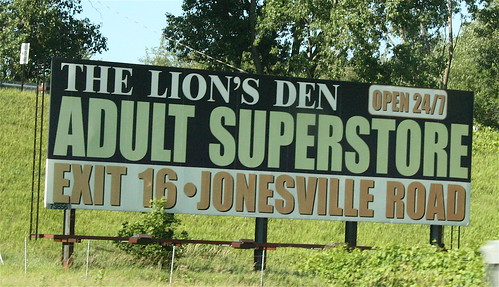
The Lion's Den is one of the biggest chain stores selling pornography and sex toys in the US. Toys in Babeland they're not, and their unpretentious stores – perhaps catering to the truck-driving profession – are often located in rural and small-town areas alongside major highways. If you live in the eastern US, you've probably seen these signs. Sometimes they look like the one pictured here: big bold black and yellow text right by the roadside. But in many locations you won't see signs like these. Instead, you'll see a ridiculously tall pole emanating from somewhere off the highway, with a little sign that reads only: “ADULT.” It takes a moment to realize that these signs are actually on the store premises, but are built tall enough to be seen from the highway. (You can imagine the fun I had searching, without success, for a photographic example. It included the gem: "Adult World: Don't Forget Mom on Mother's Day.")
Why? Because some places, like South Carolina, forbid roadside advertising for anything to do with sex. No matter that the billboards contain nothing but euphemistic text; if it's “adult,” it can't be advertised on the highway. The on-premises signs are the Lion's Den's loophole.
Such silly laws have been challenged before - for example, Missouri's was struck down in 2006, and Georgia's in 1998 - and South Carolina's is on its way out. It was passed in 2006 and would have required all existing signs to be eliminated this month, but a federal district court this month entered an injunction to stop the ban going into effect. Carolina Pride, Inc. d/b/a The Lions Den v. McMaster, 2009 WL 238206 (D.S.C. Jan. 30, 2009).
The court rejected a series of justifications by the state that rise, or perhaps sink, to the level of entertainment. Their first justification is old hat in billboard-related cases: the signs will dangerously distract drivers, "including easily distracted teenage drivers." The court says, in effect, please. We're not talking about the billboards for Dejavu Showgirls in my native Louisville, Ky., which pretty much show you what they're advertising. Just text here, folks - and that's about as likely to distract drivers as "any other road signs which may cause the driver to begin thinking of something other than the road ahead (which is, of course, the purpose of all billboards)." The court also said that the law wasn't justified based on the perceived risk that the signs would attract minors to the stores. The court notes that this would only be a problem if they managed to get into the store, which the store is not supposed to let them do.
The court also rejected a couple of particularly amusing arguments, starting with the danger that parents might, Heaven forfend, have to explain to their kids what these signs are for. The court said:
In the modern age, parents are often required to limit their children's access to inappropriate materials including radio and television programs, books, videos and even certain articles (or advertisements) in newspapers in which a child might see announcements.But my favorite part of the opinion deals with the state's attempt to invoke the harmful "secondary effect," of adult businesses. Most regulations of adult businesses are premised on the secondary-effects doctrine, which essentially blames porn shops and strip clubs for increasing all manner of criminal activity in the surrounding area. It's hard to tie this to advertising, but the state gives it a go, saying that the Lion's Den signs attract "transient customers who have a higher likelihood of committing criminal offenses in the surrounding areas." The court's reply:
At oral argument, defense counsel repeatedly used the term “transients” to refer to those non-local persons traveling the public highways who might visit an adult business. In other contexts, South Carolina officials refer to non-residents who may spend money in the State as “tourists.” Tourism is, in fact, heavily encouraged by the State through, inter alia, the State's current standard license plate which bears the motto “Travel2SC.com .”Since it's only a preliminary injunction, of course, the State of South Carolina will have the opportunity to spend more taxpayer dollars trying to scare up evidence, or whatever it wants to try to pass off as evidence, to change the court's mind.
No comments:
Post a Comment